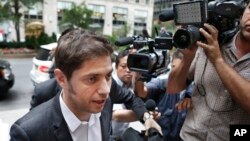Several hours of negotiations between Argentine officials and holdout investors ended without a resolution, Economy Minister Axel Kicillof said in New York on Tuesday, just a day before the nation faces a possible default.
Kicillof left the meeting at the court-appointed mediator's office in Manhattan at about 11:20 p.m. EDT (0320 GMT), saying talks would continue Wednesday, although no time was set. If a deal is not reached, Argentina faces another default on its sovereign obligations.
“I cannot give information,” he told reporters after leaving the offices where mediator Daniel Pollack is based. “We are working.
"These were the first face-to-face talks between the parties. There was a frank exchange of views and concerns. The issues that divide the parties remain unresolved,” he said.
After a long battle in the U.S. courts, the South American nation is out of options: it has until the end of the day to either pay in full the hedge funds that rejected its restructuring on their defaulted bonds, cut a deal or win a stay of the court order that triggered the deadline.
'Holdout' hedge funds
The so-called "holdout" hedge funds whose refusal to accept a write-down on debt it defaulted on in 2001 has pushed Latin America's third-largest economy to the brink of a new default.
Argentina's isolation from global credit markets since its 2002 default on $100 billion means a default would be highly unlikely to cause financial turmoil abroad, but it would hurt a domestic economy already in recession.
Buenos Aires, which has insisted the only possible solution is for U.S. District Judge Thomas Griesa to suspend his ruling in favor of the hedge funds, maintained a defiant tone.
Griesa's ruling has trapped Argentina in a Catch-22, barring it from making payments on its restructured debt without also paying the holdouts the full $1.3 billion it owes them.
But Argentina's 2005 and 2010 debt restructuring deals -- in which creditors accepted a 70-percent write-down -- could fall apart if it pays the hedge funds in full.
The 92 percent of creditors who agreed to take a haircut could launch claims for equal treatment under what is called a Rights Upon Future Offers, or RUFO, clause.
Argentina was due to make a $539-million payment on the restructured bonds on June 30. The 30-day grace period expires at midnight Wednesday (0400 GMT).
The RUFO clause meanwhile expires at the end of the year, leaving Argentina scrambling to find a way to placate the holdouts until then.
Last week, Griesa had ordered around-the-clock negotiations, but sporadic talks did not seem to take on a sense of urgency until a team of negotiators from Argentina showed up Tuesday morning.
Refused to negotiate
Argentina President Cristina Fernandez has long refused to negotiate with the U.S. hedge funds, led by New York billionaire Paul Singer's NML Capital Ltd., which spent more than a decade litigating for payment in full rather than agreeing to provide Argentina with debt relief.
Argentina has labeled the U.S. funds "vultures" for picking up bonds on the cheap. The government has said paying the U.S. funds would likely trigger lawsuits from other bondholders demanding payment on similar terms. Argentina says that would cost more than $20 billion.
Kicillof's appearance at the office of the court-appointed mediator presiding over the negotiations was his first in more than three weeks. The scant progress made in talks, and Kicillof's absence, had raised questions over Argentina's commitment to reach a settlement with the holdouts.
The minister, who this year brokered deals with the Paris Club of creditor nations and Spanish energy giant Repsol, made no comment to reporters staking out Pollack's office.
NML Capital, a unit of Elliott Capital Management, and Aurelius Capital Management, the two hedge funds central to the legal battle, have said they are willing to negotiate a deal. They were awarded $1.33 billion, plus interest, by Griesa, who ordered Argentina to pay the holdouts at the same time as other investors.
Some information for this report provided by Reuters, AFP and AP.





